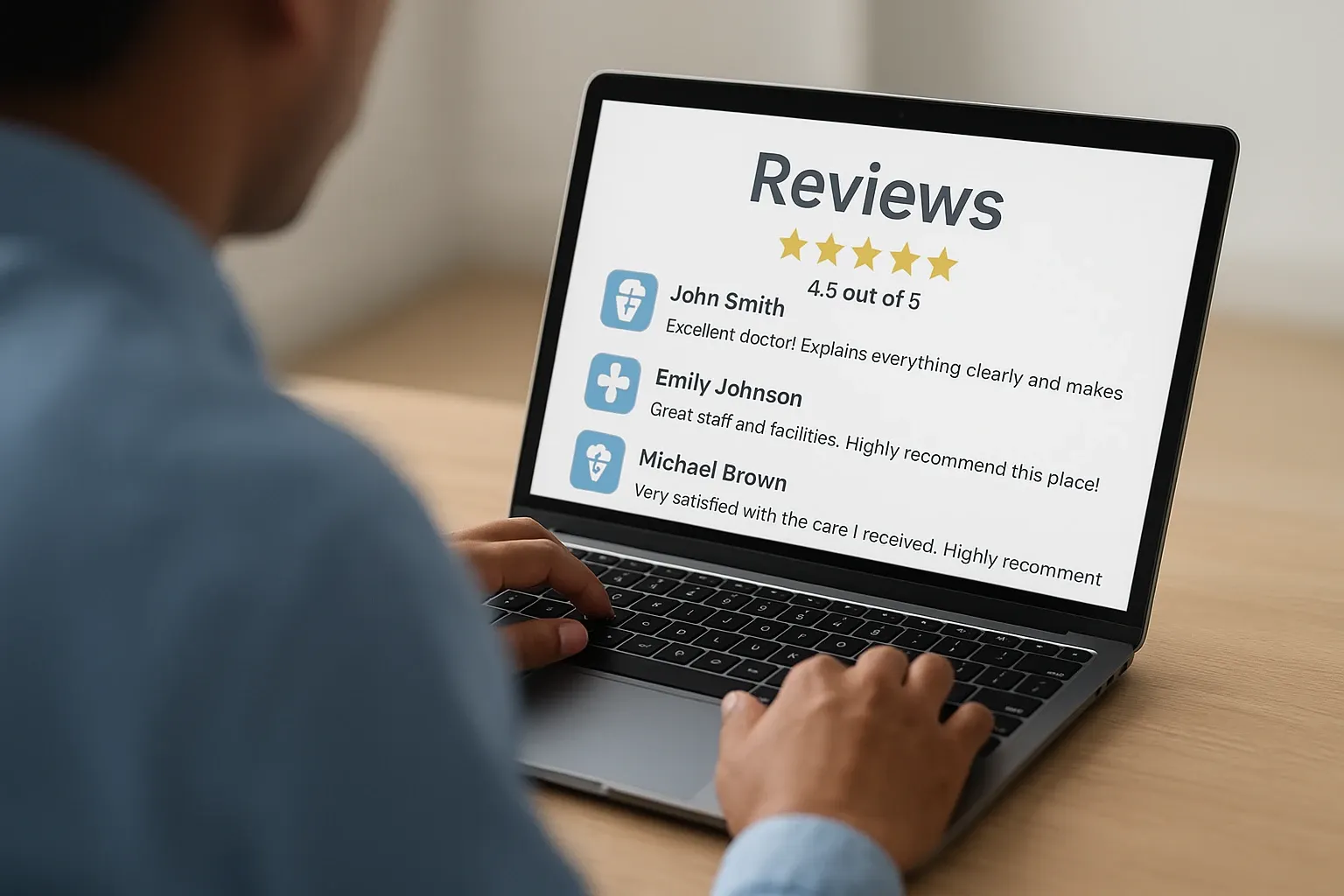In today's digital-first world, patients trust other patients more than advertisements. According to BrightLocal survey (2024), 87% of people read online reviews for local businesses—including healthcare providers—before booking an appointment. This makes patient testimonials one of the most powerful tools for doctors, clinics, and hospitals in Gurgaon to build trust, strengthen credibility, and enhance their overall reputation.
But testimonials are not just about reviews—they are about showcasing genuine patient experiences. When shared effectively, they can reflect the quality of care, compassion, and reliability of a healthcare provider, making them a vital part of reputation-building for Gurgaon's competitive healthcare landscape.
Whether you're a clinic in DLF Phase 1, a hospital in Sector 44, or a specialist practice near Cyber Hub, this guide will show you how to ethically leverage patient testimonials to boost your online reputation and attract more patients in Gurgaon.

Patient testimonials rely on the principle of social proof, a psychological phenomenon identified by Robert Cialdini. When potential patients in Gurgaon see others sharing positive healthcare experiences, they are more likely to trust the doctor or clinic.
Why Testimonials Work So Well in Healthcare:
- They validate a provider's expertise and professionalism - A cardiologist in Sector 56 gains credibility when patients share recovery stories
- They reduce anxiety and uncertainty in decision-making - Healthcare choices are emotional; testimonials provide reassurance
- They create an emotional connection by telling relatable patient stories from similar demographics in Gurgaon
In healthcare, storytelling is far more persuasive than statistics alone, which is why testimonials resonate deeply with audiences.

While testimonials are impactful, their use must always follow ethical and professional guidelines, especially in India where Medical Council of India (MCI) guidelines govern healthcare marketing practices.
Key Ethical Guidelines for Gurgaon Healthcare Providers:
- Patient Consent: Always obtain clear and documented permission before publishing testimonials. Use written consent forms that specify how the testimonial will be used.
- Transparency: Avoid editing or exaggerating reviews, as this can damage trust and violate professional ethics.
- Balanced Representation: Share a variety of stories, not just extraordinary cases, to maintain realistic expectations.
Maintaining ethical integrity ensures that testimonials strengthen reputation rather than harm it.

Patient testimonials contribute significantly to shaping a doctor's or clinic's public image in Gurgaon's healthcare ecosystem:
How Testimonials Build Your Healthcare Reputation:
- They humanize healthcare by highlighting patient experiences beyond clinical outcomes
- They reflect consistency in service quality and patient satisfaction across different treatment areas
- They build a narrative of compassion, reliability, and trustworthiness that sets you apart from competitors
In today's digital landscape, testimonials are not just reviews—they are the voice of your patients that defines your reputation in Gurgaon's competitive healthcare market.
If not managed carefully, testimonials can backfire and damage your reputation in Gurgaon's healthcare community:
Common Risks and How to Avoid Them:
1. Fake or Incentivized Reviews:
- Risk: Discovery of manipulated testimonials can cause severe credibility loss
- Solution: Only use genuine, unsolicited patient feedback
2. Unrealistic Expectations:
- Risk: Overly polished stories may lead patients to expect outcomes that are not always possible
- Solution: Include disclaimers and share varied patient experiences
3. Over-Reliance on Testimonials:
- Risk: Depending only on testimonials while ignoring other important factors (credentials, clinical results) weakens reputation
- Solution: Balance testimonials with professional qualifications and clinical expertise
4. Platform-Specific Risks:
Gurgaon patients often use Google Reviews and Practo to evaluate doctors and clinics. Fake reviews flagged by users can damage credibility and result in platform penalties.
A balanced and authentic approach ensures testimonials remain an asset rather than a liability.
Patient testimonials are trust-building assets that shape reputation, credibility, and long-term patient relationships in Gurgaon's competitive healthcare market. When collected ethically and used thoughtfully, they help Gurgaon doctors and hospitals:
- Strengthen their online presence across multiple platforms
- Build deeper patient connections through authentic storytelling
- Gain a lasting competitive advantage in Gurgaon's healthcare landscape
- Improve local SEO rankings for area-specific healthcare searches
In Gurgaon, testimonials are not just words—they are a digital extension of patient care and trust. Whether you're a pediatrician in DLF Phase 1, a cardiologist in Sector 56, or a multi-specialty hospital near Cyber Hub, implementing these testimonial strategies will help you build a reputation that attracts and retains patients.
Yes, it's legal for Indian doctors to use patient testimonials, but they must follow Medical Council of India guidelines. Always obtain written consent, avoid making false claims or guaranteeing outcomes, and focus on patient experience rather than specific medical results. Respect patient privacy by using initials and avoiding detailed medical information.
Focus on post-treatment follow-up care and naturally ask about their experience. Send follow-up messages checking on recovery, and if patients express satisfaction, politely request them to share their experience. Never incentivize reviews with discounts or gifts, as this violates professional ethics and platform policies.
Google My Business is crucial for local discovery, as 85% of Gurgaon patients check Google reviews before visiting. However, Practo is equally important for healthcare-specific searches. Focus on both platforms, with your website serving as the hub for detailed testimonial content.
Respond professionally and promptly to negative reviews. Acknowledge the patient's concerns, apologize for any inconvenience, and offer to discuss the matter privately. Never delete negative reviews or argue publicly. Use them as opportunities to show your commitment to patient satisfaction and continuous improvement.
Minor edits for grammar and clarity are acceptable, but never change the meaning or exaggerate the content. Always show the edited version to the patient for approval before publishing. Transparency and authenticity are key to maintaining trust and complying with ethical guidelines.
Aim to collect testimonials regularly but publish them strategically. Fresh testimonials every 2-4 weeks show active patient care and improve SEO. However, quality is more important than quantity - focus on meaningful, detailed testimonials rather than collecting many brief reviews.
